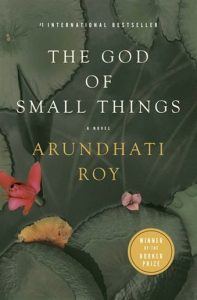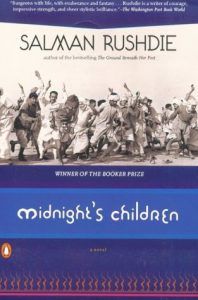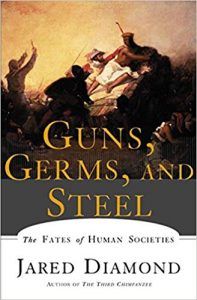by Hari Balasubramanian
 A bit of self indulgence – also a kind of preface to all the 3 Quarks Daily essays I’ve written.
A bit of self indulgence – also a kind of preface to all the 3 Quarks Daily essays I’ve written.
I’ve always thought of myself as someone who is more drawn to the humanities than to math or the sciences. This can seem very puzzling to someone who looks at my career details: degrees in engineering and a career in academia in a branch of applied mathematics called operations research. Even I am stumped sometimes – how did I get so deep into a quantitative field when all my life I’ve held that literature (literary fiction in particular), history and travel are far better at revealing something about the human condition than any other pursuit?
Some follow an ambition stubbornly wherever it takes them and whatever the consequences. I did not have that kind of resolve. Growing up in west and central India, I read a lot English and American fiction – Agatha Christie, Alfred Hitchcock, Alistair Maclean – and decided that I must become a writer (English only of course for the mentally colonized, why would I write in Tamil or Hindi?). The ambition was strong enough to have a grip on my thoughts for the next two decades, but never strong enough to counter practical concerns. Like many middle class families, my parents felt I had to get into an engineering or medical college since both offered the promise of financial stability. I simply went along, following what high school friends around me were doing. After toying with majors as diverse as electronics and metallurgy I finally settled on something called production engineering. In 1996, I left home and attended what was then called the Regional Engineering College, twenty kilometers from the south Indian city of Tiruchirappalli: a semi-industrial, semi-rural middle of nowhere kind of campus where teenagers from far flung states of India came and lived in packed hostels for four years.
The ambition to become a writer, meanwhile, bided its time. All you had to do was write one breakthrough novel, something like Arundhati Roy’s The God of Small Things, become famous, then write full time: that was the naïve worldview that sustained me for a long time.
In college, I largely ignored the engineering curriculum – one semester I was ranked 32 in my class of 40 – instead I spent time typing up verbose short stories and poems that sounded as if I was preparing for the GRE (which I was). In any case, from the very first year conversations in hostel corridors centered not on the laws of thermodynamics or how an antenna worked but on salaries at recruiting multinational companies, the boom in software jobs, MBAs, and funded scholarships at American universities. College was a passageway to prosperity but the curriculum itself seemed secondary.
It did not occur to me then that learning technical material required patience and curiosity in the classroom and labs, working out problems carefully, allowing a difficult concept to slowly seep into you. If you persist, you finally touch the mystery that lies at the heart of an equation or natural phenomenon, and this keeps you coming back for more. Four years in college gives you time to persist with the difficult concepts of engineering and mathematics – I missed my chance and now it’s hard to catch up. I am able these days to read a complex literary work like Tolstoy’s War and Peace, or get deep into the historical details of a particular place or people, but I find it difficult to open a physics, math or biology textbook and learn things on my own – even if the text is Feynman Lectures on Physics, written by one of the best science communicators of the 20th century.
§
In August 2000, a few months after finishing college, I arrived in Arizona State University for graduate school. My major was something called Industrial Engineering. As before, this wasn’t a decision that considered my true interests; I was only following the steps of my college friends, and the thousands of students across India, who were headed to American universities. In retrospect, it seems that we were all willing pawns, flung across continents by the forces of globalization. I was neutral to what I specialized in; my only goal at the time was to travel abroad because I feared that if I took a job in India I would never get chance to see another country. Yes, such silly ideas can inform important decisions!
Industrial engineering is the odd one among engineering majors in that it is not based on physical laws. It uses instead a combination of mathematical methods, algorithms, economics and management techniques to improve ‘systems’: that nebulous, catch-all term that could mean anything – a supply chain, an assembly line, a transportation network. These methods, generally pitched for executives, managers and administrators, were and still are considered indispensable in any organization. In all the textbooks and classes, there was an unabashed focus on efficiency, reducing costs, and maximizing profit which I found dispiriting; it seemed diametrically opposed to the lyricism, beauty and open-endedness that I sought in literature. I noticed there wasn’t a close questioning of the effects of cutting costs and maximizing profits – how it produced a harried culture where everyone was overworked, everything had to be obsessively quantified, and there was little time to reflect on what was happening.
What kept me going, though, was the mathematics – the mathematics itself (when I could understand the notation: it never came easily to me and I still struggle with it) was neutral to everything, it had a puzzle-like quality that drew me in and kept me intrigued. The methods of teaching were very different from India: American professors were engaging, you could bring text books to exams, an intuitive understanding of the material was encouraged and nothing had to be memorized. For the first time, I began to pay attention during classes. I wrote a master’s thesis and decided to stay for a doctoral degree. It was a big decision that I was very casual about, but I wasn’t interested in joining the corporate world and staying on at the university was more comfortable than doing anything else. I lived in shared apartments for six years and got by easily on a monthly stipend of $800-1200.

I liked graduate school because it gave me sufficient time, after all the coursework and research, to read and write. At the time, I thought of fiction as the highest form of creative expression; nothing else was worth it. But I had hardly read anything; I had just begun to catch up on what is thought of as ‘serious’ literature: Faulkner, Hemingway, Gabriel Garcia Marquez, Orhan Pamuk, Salman Rushdie. I thought Rushdie’s Midnight’s Children was astonishing in its inventiveness; it held me in its spell for years. I dreamed of doing something similar. I tried my best to write regularly but was not successful. My short stories were not coming out well; I found myself agonizing over authenticity, what kind of narrative voice to use, plot devices, dialogue. I discovered why fiction is so hard: the sheer number of possibilities, the many directions in which you can take a story can exhaust you.
The idea that literary fiction is the pinnacle of creative expression started to fade in August 2004, when I read Jared Diamond’s Guns, Germs and Steel. GGS asks very grand questions: why did history turn out the way it did? why are some parts of the world more developed (have more ‘cargo’) than others? what explained the significant differences between how colonialism and demographic realities played out in Asia and Africa as opposed to Americas and Australia? GGS filled gaps in my historical understanding in a manner that no other book had done – it explained how geographic connectedness to other regions and ecological factors favorable to agriculture and domestication of animals had given certain parts of the world a head start in creating complex societies and dominating others. I was also startled at how diseases previously absent in one continent can suddenly appear and, in combination with relentless conquest and ethnic cleansing, wreak demographic havoc, as they did in the Americas and Australia. From mundane everyday stuff like chilies which I thought were Indian but are actually Mexican, to more sobering facts such as why there are now as many Indian Americans as American Indians in the United States, GGS opened up a new eco-geographic way of looking at history that had been absent in all the dry dynasties-kings-and-empires history I’d learned. (Although Diamond gets a lot of credit for GGS, it must be said that he was only putting together ideas that had already been articulated, but not in such a bestselling way.)
 Around the same time, I happened to read VS Naipaul’s essays and books based on his travels to India, Iran, Pakistan, Ivory Coast, Congo, United States, and Indonesia. GGS and Naipaul’s books – and later Charles Mann’s 1491 – seeded the idea that perhaps I too could combine travel with history, both cultural and ecological, and write something that had a new perspective. I certainly found it a lot easier than writing fiction. I traveled to American Indian reservations and to Latin American countries, hoping to write a book that contrasted the indigenous pre-Columbus history of the Americas – a theme that had intrigued for a long time – with what had happened on the Indian subcontinent. The book never materialized, it was all too abstract and weakly conceived, but the travel and research I voluntarily took on matched or even exceeded the effort I put into my doctoral studies in engineering.
Around the same time, I happened to read VS Naipaul’s essays and books based on his travels to India, Iran, Pakistan, Ivory Coast, Congo, United States, and Indonesia. GGS and Naipaul’s books – and later Charles Mann’s 1491 – seeded the idea that perhaps I too could combine travel with history, both cultural and ecological, and write something that had a new perspective. I certainly found it a lot easier than writing fiction. I traveled to American Indian reservations and to Latin American countries, hoping to write a book that contrasted the indigenous pre-Columbus history of the Americas – a theme that had intrigued for a long time – with what had happened on the Indian subcontinent. The book never materialized, it was all too abstract and weakly conceived, but the travel and research I voluntarily took on matched or even exceeded the effort I put into my doctoral studies in engineering.
§
This then was the dual life I led: on the ‘outside’, I was an Indian engineer in the US, working on his PhD, and this is what most people saw; ‘inside’ I saw myself as some kind of literary person, traveling, reading and writing, and eventually making this my primary identity. But the only writing that was receiving any external recognition was my academic work; my research papers, which I gave little importance to and even ridiculed, kept getting published. In May 2008, I was offered an assistant professor position in Industrial Engineering at the University of Massachusetts, Amherst. I accepted it. I rationalized it with the thought that academia is the place where I’d have time to do what I wanted, particularly during the summer and winter breaks when there were no classes. Indeed, despite the pressures of tenure – publishing, writing research grants, teaching and mentoring doctoral students – I set off in my early years on trips to Mexico, Peru, and Bolivia, countries that, unlike Canada and US, still had large indigenous populations. Bolivia in particular fascinated me since, in 2006, it had elected an Aymara, Evo Morales, as president for the first time in its history. I hoped to collect the travel material in a book or a series of essays.
But academic life had other plans for me and began to affect me in an unexpected way. Teaching in particular had a huge influence; I took a real liking to it. Tolstoy defined art “as that human activity which consists in one person’s consciously conveying to others, by certain external signs, the feelings he or she has experienced, and in others being infected by those feelings and also experiencing them.” Teaching a mathematical concept, by this definition, is an art: you have to first ‘feel’ the force or beauty of that concept internally within you; then, in the classroom – which I’ve come to regard as a stage where one ‘performs’ – you have to convey what you feel so that your students get infected and can experience it too. I wasn’t always successful at it, but the more I taught, the more I felt drawn to concepts in probability and mathematics.
I also became a lot more curious about science and engineering, the very stuff that I had ignored in college. Maybe it was the campus conversations with academics and nerdy types, or frequent visits to the Harvard and MIT bookstores, where books on science had an equal footing with everything else. For the first time I had the chance, while reading Brian Greene’s The Elegant Universe, to let the immensity of Einstein’s theories of relativity sink in – I had only known about Einstein’s fame not why he was famous. The biologist Edward Wilson’s research papers on the organization of ant colonies, biodiversity and conservation, collected in the book Nature Revealed, instilled a new curiosity about the natural world. Until then, I had thought of nature as beautiful, but not as something that possesses a structure that can be analyzed. Because I now lived in a small western Massachusetts town surrounded by woods and swamps, there was a chance to observe patterns in nature more closely. Then in 2009, I started following 3 Quarks Daily and was instantly taken by the seamless blending together of content in science, economics, politics, literature and art.
A consequence of all this was that the part of me that was drawn to literary fiction, history and the humanities no longer considered itself adversary to the part that was now drawn to certain types of mathematics and science. I read Russian literary classics during these years with the same enthusiasm that I read a text on probability or a book on evolution. When I became a guest columnist on 3QD in 2014 – what a thrill it was to be selected! – I decided I would not focus on one theme, but allow all my interests to express themselves. This is why my columns have drifted unevenly across many topics, without a center or focus: I’ve written on the science of queueing and concepts in statistics, then suddenly shifted to topics such as linguistic diversity and the ecological impact of beavers, and yet other times returned to travelogues based on trips to Ecuador or Turkey. The pieces didn’t always turn out the way I wanted, and sometimes they took on too dry or academic a tone, but the act of researching and writing each piece, immersing myself in one topic then hopping to something else altogether, has been very satisfying.
So that’s where I find myself now – a lot more comfortable with this arbitrary mishmash of interests than those years when there was always a tension to switch full time to literary writing. It’s a turn of affairs that an older, purist self would have found unsatisfactory but that self is long gone! Thanks to the accident of a career that I never really wanted and a longstanding interest in the one I did want, aspects of both the sciences and humanities have started to come together – and I hope it continues to be that way.
